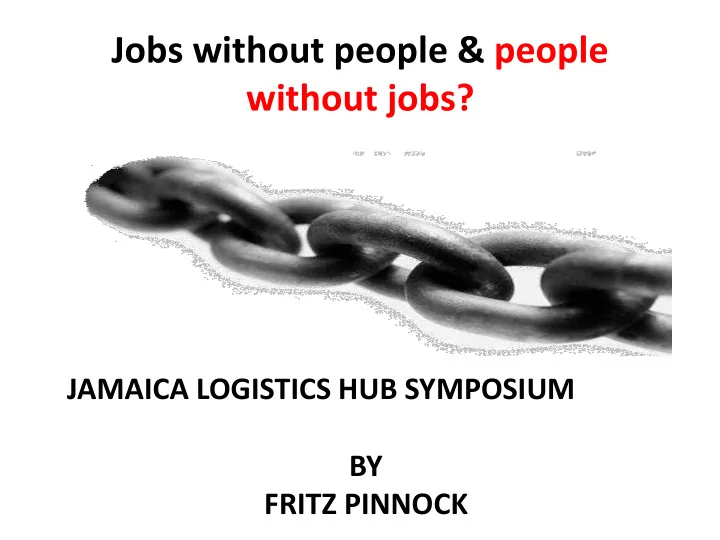

Jobs without people & people without jobs? JAMAICA LOGISTICS HUB SYMPOSIUM BY FRITZ PINNOCK
Losing Sight of the Common Objective I'm glad that the hole is not on our side !
SKILLS MISMATCH • “Economists call it a skills “mismatch.” The country is in dire need of engineers, health workers and skilled tradespeople. Yet tens of thousands of students continue to pursue degrees in the arts and humanities”. (BBC)
Social Networking = more “ real time ” data points
THE RISE OF MOBILE On average, it takes 90 minutes for people to respond to an email, but only 90 seconds to respond to a text message. The global mobile market will grow from $3.4 billion in 2010, to $22 billion in 2016.
THE FUTURE JOBS “ There is no future in any job. The future lies in the person who holds the job. ” – George W. Crane • Higher education is that they tend to prepare students for jobs of the past., “ They are constantly shooting behind the duck. ” • 2 BILLION JOBS WILL DISAPPEAR BY 2030 OR 50% OF ALL THE JOBS • As a rule of thumb, 60% of the jobs 10 years from now haven ’ t been invented yet.
THE SHIFTING NATURE OF OCCUPATIONS Jobs That Disappeared New Jobs Elevator operator programmer long distance operator computerized high tech security key punch operator web site designer encyclopedia salesperson computer graphic artist Telegraph operator software engineer typesetter financial manager Radio actor club disc jockey
GLOBAL TALENT SHORTAGE – ENGINEERS “ GROW YOUR OWN TALENT ” • China is now graduating 600,000 engineers per year • India graduates 350,000 • All Europe graduates 100,000 • U.S. graduates 70,000 • Mexico is also becoming an engineering powerhouse – but where are the jobs? • Producing more engineers than Brazil, Germany or Canada • Jamaica 350 ??
TOP 10 MOST DIFFICULT TO FILL JOBS (RANK IN ORDER) 1. Skilled Trades 2. Sales Representatives 3. Technicians (Primarily production/operations, engineering or Maintenance 4. Engineers 5. Accounting and Finance 6. Production Operators 7. Secretaries, Pas, Administrative Assistants & Office Support Staff 8. Managers/Executives 9. Drivers 10.Labourers
• A PricewaterhouseCoopers survey that found two-thirds of CEOs ranked the lack of key skills as the biggest threat to their growth prospects. • 70 PERCENT OF DEGREES – LIBERAL ARTS. • TECHNICAL SCHOOLS ARE SECOND RATE GRAMMER SCHOOLS.
STEM JOBS • As of 2011, 26 million U.S. jobs — 20 percent of all jobs — require a high level of knowledge in any one STEM field. • STEM jobs have doubled as a share of all jobs since the Industrial Revolution - 10 percent in 1850 to 20 percent in 2010.
• Half of all STEM jobs are available to workers without a four-year college degree , and these jobs pay $53,000 on average — a wage 10 percent higher than jobs with similar educational requirements. • Manufacturing, health care, or construction industries. Installation, maintenance, and repair occupations constitute 12 percent of all STEM jobs
HEADLINES • “Traditional degrees will not fill skills gap, says CBI” – BBC – UK • The UK risks failing to close its "chronic skills gaps" by continuing to focus teenagers on the university "default route", say business leaders.
• Instead more young people should take shorter or part-time degrees and advanced apprenticeships. • The report, Tomorrow's Growth, predicts that by 2020 nearly half of all employment will be in "highly-skilled roles".
Dual System Degrees / Skills 1. Credentialing and skill building is gaining steam - scarce competences and critical roles. skill building and credentialing will exceed popularity of people getting degrees 1. Focus on education AND skills - Hire not only on degrees but also on skills. Disconnect or mismatch between candidates who have degrees and the skills that employers are looking for.
3. Education should teach people HOW to think. (Not what) – Knowledge is available on the internet – need to know what to do with it. 4. TECHNICAL & VOCATIONAL – CAN PLAY A MORE STRATEGIC ROLE. Resolve the misalignment between what employers want and what education offers.
Focus • Technical schools – 14 – Quality of teachers • Labs – Simulators – (Base line study) • Apprenticeship – Focus on the “What” and not the “how” and “when” of learning. • Use the improved facilities at tertiary institutions to run STEM camps during the summer. • Attitude – uniform groups in school – introduction of marine cadet corp.
Network of Academic & Training Institutions (Competency Based Training) ACADEMIC UNIVERSITIES UWI, UTECH, CARIBBEAN MARITIME UCC, NCU, IUC INSTITUTE HEART/NCTVET PROFESSIONAL LOGISTICS ORGANIZATIONS
IT DONE
Recommend
More recommend